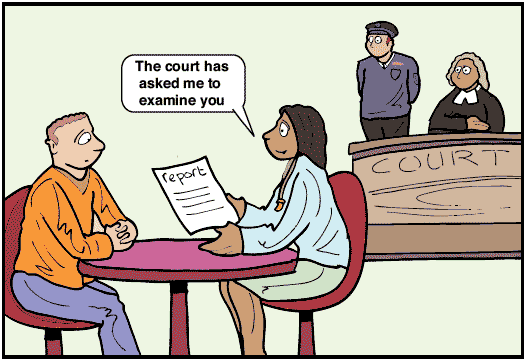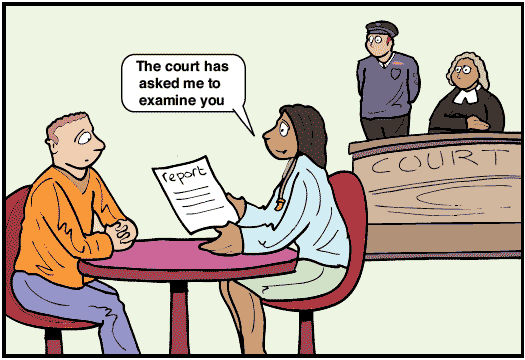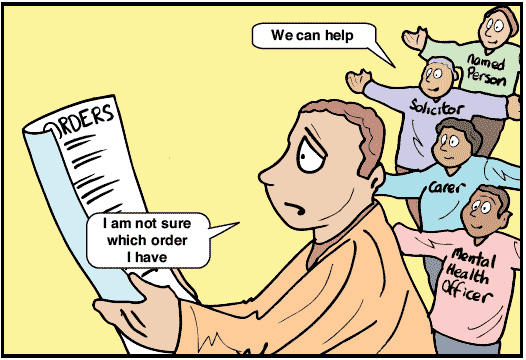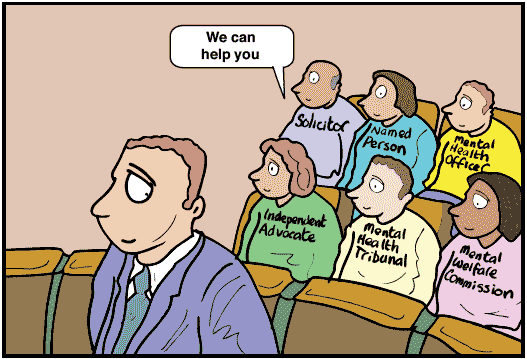Mental Health Act: easy read guide
An easy read guide to the Mental Health Act.
13 People involved in criminal proceedings

- How might the new law affect me?
- What are the different court orders?
- Who can help if I am involved with the police or courts?
- When can the courts use the new law to give me treatment?
- What are the different orders the courts use?
How might the new law affect me?
If the police believe you have done something wrong you may have to go to court. There may be criminal proceedings. These are the steps the police and courts take to decide if you are guilty or not guilty.
The court can ask a doctor to examine you to find out about your mental disorder.
The doctor gives the court a report.
The report helps the court decide if you need treatment. It also helps the court decide what to do about your case.

The police and courts can use compulsory powers to give you treatment. Compulsory means you have treatment even if you do not want it. They do this when they believe:
- you have a mental disorder
- treatment may help you
- you may not be safe if you do not have treatment
- there is no other way to give you treatment.
The court use orders to say how you should have treatment. These are listed on page 106.

On the next page there is a list of orders with page numbers to help you find the one you need to read about.
Sometimes the police use special powers to help you when you are ill. You have not done anything wrong. They use these powers to help you get care and treatment. You can read more about these emergency powers.
What are the different orders?
1. Assessment Order - page 109
2. Treatment Order - page 110
3. Temporary Compulsion Order - page 111
4. Acquitted but detained - page 112
5. Remand on bail for enquiry - page 113
6. Committal to hospital for enquiry - page 114
7. Interim Compulsion Order - page 115
8. Compulsion Order - page 116
9. Restriction Order - page 118
10. Hospital Direction - page 119
11. Transfer for Treatment Direction - page 121
12. Probation Order with Requirement of Treatment - page 123
Remember, you should ask if you are not sure what order you have been given.
Who can help you if you have to go to court?
Solicitor
You can ask a solicitor to give you advice. You may be able to get legal aid. Legal aid means that you can get help to pay for a solicitor if you cannot afford it. A solicitor should tell you how to get this.
Mental health officer
This is a specially trained social worker who helps people who have a mental disorder. He/she should tell you about your rights and make sure you get the care you need.

Named Person
This is someone you choose to look out for you if you are ill. They help decide about your care and treatment. If you do not choose anyone, your primary carer or nearest relative becomes your named person.
Independent Advocate
Someone who helps you say what you think about your care and treatment. They help you get all the information you need and support you at important meetings. They are called "independent" because they are not tied to other services. Your doctor, hospital or social work department should help you find an independent advocate.
Mental Health Tribunal
This is the organisation that decides about your care and treatment if you have compulsory treatment. (This means you have treatment even if you do not want it.)
Mental Welfare Commission
They look after people who need help because of a mental disorder. They make sure all treatment follows the law. You can speak to them at any time if you are unhappy about your care and treatment.
Advance Statements
An advance statement is when you write down how you would like to be treated if you become ill in the future. People caring for you read your advance statement and think about your wishes.
1. Assessment Order
When?
You are waiting for your trial and the court thinks you are ill. They ask a doctor to examine you. The doctor says that you need to go to hospital to be examined.
How long?
The court can order you to stay in hospital for ![]() 28 days. This allows a psychiatrist (specially trained doctor) to examine you. Seven days can be added if the doctor needs more time.
28 days. This allows a psychiatrist (specially trained doctor) to examine you. Seven days can be added if the doctor needs more time.
What happens next?
He/she gives a report to the court. The court then decides if you are well enough to go to trial. They can also decide you need to stay in hospital for treatment.
Agree to treatment?
If you do not agree to treatment the doctor must get a second doctor to agree. Then you can be given treatment.
Appeal?
You cannot appeal against this order. Your doctor tells the court if the order should be changed or stopped. Appeal means you ask the court to change its decision.
2. Treatment Order
When?
You are waiting for your trial and the court thinks you are ill. The court can order you to stay in hospital for treatment. The court can only do this if two doctors examine you and agree. One of the doctors must be a psychiatrist.
How long?
There is no fixed time for this order. It can last until the court decides what to do about your case.
Agree to treatment?
If you do not agree to treatment your doctor must get a second doctor to agree. Then you can be given treatment. (The second doctor is chosen by the Mental Welfare Commission.)
Appeal?
You cannot appeal against this order. Your doctor tells the court if the order should be changed or stopped. Appeal means you ask the court to change its decision.
Mental Welfare Commission: they look after those who need help because of a mental disorder. They make sure all treatment follows the law.
3. Temporary Compulsion Order
When?
The court decides that your trial cannot start (or must stop) because of your mental disorder. The court orders you to stay in hospital for treatment. The court can only do this if two doctors examine you and agree.
How long?
There is no fixed time for this order. It lasts until the court decides what to do about your case.
What happens next?
Once the order is made you have to stay in hospital.
The court continues to "examine the facts". This means they try to find out if you did the thing you have been charged with.
Appeal?
You cannot appeal against this order. Appeal means you ask the court to change its decision.
4. Acquitted but detained
When?
At the end of your trial you are acquitted if the court believe you did not do the thing you were charged with. (Acquitted means you are cleared of the charge.)
How long?
The court keeps you for ![]() 6 hours for a doctor to examine you. The doctor decides what care and treatment you need.
6 hours for a doctor to examine you. The doctor decides what care and treatment you need.
Agree to treatment?
If you do not agree to treatment during these ![]() 6 hours you cannot be given treatment.
6 hours you cannot be given treatment.
At the end of your trial you can be acquitted if:
- the court believe you did do the thing you were charged with
but
- believe you did this because of your mental disorder.
The court can then use other orders to keep you in hospital to be examined or for treatment.
5. Remand on bail for enquiry
When?
At the end of your trial you are found guilty if the court believe you did do the thing you are charged with. If the punishment is prison the court can ask for more information about your mental disorder.
How long?
They give you bail for ![]() 3 weeks to go to hospital to be examined.
3 weeks to go to hospital to be examined.
What happens next?
Bail means you do not have to be in prison. But you may have to follow some conditions (rules). A condition may be that you stay in hospital for doctors to see you. If you do not follow the conditions you have to return to court.
Agree to treatment?
If you do not agree to treatment during this time you cannot be given treatment.
Appeal?
You can appeal if the court does not give you bail. You can appeal against the conditions the court gives you. Appeal means you ask the court to change its decision.
6. Committal to hospital for enquiry
When?
If you are convicted and the punishment is prison, the court may want more information about your health:
- the court asks a doctor to examine you
- the doctor suggests you need to go to hospital for examination.
How long?
The court sends you to hospital for ![]() 3 weeks. Another
3 weeks. Another ![]() 3 weeks can be added.
3 weeks can be added.
What happens next?
In hospital you are examined by doctors. The doctor's report helps the court to decide what to do. You must stay in hospital under this order. If you leave you can be taken back to court.
Agree to treatment?
If you do not agree to treatment and the doctor thinks it is best for you he/she must get a second doctor to agree. Then you can be given treatment.
Appeal?
You can appeal against this order. Appeal means you ask the court to change its decision.
7. Interim Compulsion Order
When?
If you are convicted and the punishment is prison:
- the court asks for more information about your health
- the court asks two doctors to examine you
- the doctors must say you need to go to hospital for examination.
How long?
The court can keep you in hospital for ![]() 12 weeks. This order can be renewed every
12 weeks. This order can be renewed every ![]() 12 weeks for
12 weeks for ![]() 1 year.
1 year.
What happens next?
In hospital doctors examine you and think about what treatment you need. The doctor's report helps the court to decide what to do.
Agree to treatment?
If you do not agree to treatment your doctor must get a second doctor to agree. Then you can be given treatment. (The second doctor is chosen by the Mental Welfare Commission.)
Appeal?
You can appeal to the court against the order being made. Appeal means you ask the court to change its decision. You cannot appeal against it being renewed. Your doctor tells the court if the order needs to be changed or stopped.
8. Compulsion Order
When?
If you are convicted and the punishment is prison the court can decide not to send you to prison. They can decide:
- you must stay in hospital for treatment
or
- you must have treatment in the community.
You are examined by two doctors (one must be a psychiatrist). They must believe:
- you have a mental disorder
- you need treatment to keep you safe
- you need treatment to keep others safe.
How long?
This order is for ![]() 6 months. Your psychiatrist must keep checking your health. He/she can ask the Tribunal to change the order or stop it.
6 months. Your psychiatrist must keep checking your health. He/she can ask the Tribunal to change the order or stop it.
After ![]() 6 months your psychiatrist can renew it for another 6 months. After that it can be renewed for
6 months your psychiatrist can renew it for another 6 months. After that it can be renewed for ![]() 12 months at a time.
12 months at a time.
Treatment in the Community
The court tells you:
- where you must go to get care and treatment
- where you must live. Your mental health officer must agree if you wish to move somewhere else
- the people who must visit you:
- your mental health officer
- your doctor
- any person your doctor says should give you care or treatment.
If you do not follow the order your case may go to the Tribunal to decide. You can be taken to hospital for your own safety.
Agree to treatment?
If you do not agree to treatment your doctor must get a second doctor to agree. Then you can be given treatment. The second doctor is chosen by the Mental Welfare Commission. This is the organisation that looks after those who need help because of a mental disorder.
Appeal?
- You can appeal to the court against the order being made. Appeal means you ask the court to change its decision.
- You and your named person can ask the Tribunal to change or stop the order. The Tribunal then decides.
- The Mental Welfare Commission can also stop the order or ask the Tribunal to decide.
9. Restriction Order
When?
If you have a Compulsion Order (see pages 116 and 117) the court can also give you a Restriction Order.
This means that Scottish Ministers must agree for:
- you to move to another hospital
- to leave the hospital.
How long?
There is no fixed time for the Compulsion Order. It goes on until the Restriction Order is stopped.
Your psychiatrist and Scottish Ministers must review the order. If they want to change it they must ask the Tribunal.
The Tribunal reviews your case every 2 years.
Appeal?
You can appeal against this order. Appeal means you ask the court to change its decision.
- You and your named person can ask the Tribunal to make changes.
- The Tribunal can change or stop the order.
- The Mental Welfare Commission can ask the Tribunal to decide.
Mental Welfare Commission: the organisation that looks after those who need help because of a mental disorder. They make sure all treatment follows the law. You can speak to them at any time if you are unhappy about your care and treatment.
10. Hospital Direction
When?
If you are given a prison sentence the court can decide you need treatment for your mental disorder. You should be examined by two doctors (one should be a psychiatrist). They must believe:
- you have a mental disorder
- you need treatment to keep you and others safe.
How long?
This order ends at the same time as your prison sentence.
If the order stops before your sentence, you go to prison for the rest of the time left.
If you are in hospital at the end of your prison sentence your doctor may think you need to stay in hospital. He/she can ask the Tribunal to decide this.
What happens next?
The Scottish Ministers:
- must agree if you move to another hospital
- must agree if you leave the hospital
- must keep reviewing if you need to be on the order
- can sometimes order you to go to prison for the rest of the sentence.
Agree to treatment?
If you do not agree to treatment your doctor must get a second doctor to agree. Then you can be given treatment. (The second doctor is chosen by the Mental Welfare Commission.)
Appeal?
You can appeal to the court before the order is made. Appeal means you ask the court to change the decision.
The Scottish Ministers can also stop the order.
You and your named person can ask the Tribunal to decide.
The Mental Welfare Commission can ask the Tribunal to decide.
Mental Welfare Commission: the organisation that looks after those who need help because of a mental disorder. They make sure all treatment follows the law. You can speak to them at any time if you are unhappy about your care and treatment.
11. Transfer for Treatment Direction
When?
If you are in prison and your doctors believe:
- you have a mental disorder
- you need treatment to keep you and others safe
you can be taken to hospital for care and treatment.
What happens?
The Scottish Ministers:
- must agree if you move to another hospital
- must agree if you leave the hospital
- must keep reviewing if you need to be on the order
- can sometimes order you to go to prison for the rest of the sentence.
How long?
This order ends at the same time as your sentence.
If the order stops before your prison sentence you go to prison for the rest of the time left.
If you are in hospital at the end of your prison sentence your doctor may think you need to stay in hospital. He/she can ask the Tribunal to decide this.
Agree to treatment?
If you do not agree to treatment your doctor must get a second doctor to agree. Then you will be given treatment. (The second doctor will be chosen by the Mental Welfare Commission).
Appeal?
You can appeal to the court against the order being made. Appeal means you ask the court to change the decision.
- You and your named person can ask the Tribunal to stop it.
- The Tribunal can decide to stop the order.
- The Scottish Ministers can also stop the order.
- The Mental Welfare Commission can ask the Tribunal to decide.
Mental Welfare Commission: the organisation that looks after those who need help because of a mental disorder. They make sure all treatment follows the law. You can speak to them at any time if you are unhappy about your care and treatment.
12. Probation Order with Requirement of Treatment
When?
If you leave prison on probation you have to follow certain rules. This order says you must have treatment for your mental disorder.
It can ask you to go to a surgery or a hospital for treatment. The court cannot give you this order unless you agree.
The order must be recommended by:
- a psychiatrist
- the doctor who will be giving you the treatment
- your supervising officer (someone your local authority appoints to look after you on probation).
How Long?
The order can last for up to ![]() 3 years.
3 years.
What happens if you do not keep to the rules?
You may have to go back to court:
- if you do not keep your appointments
- if you refuse treatment
- if you leave hospital without permission.
Agree to treatment?
If you do not agree to treatment during this time you cannot be given treatment.
There is a problem
Thanks for your feedback